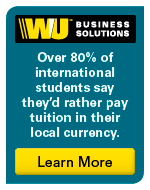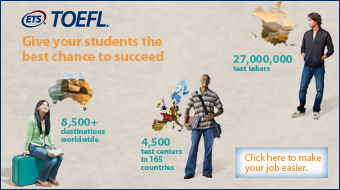
| IIE Home | Membership | Publications | Open Doors | Contact Us | Subscribe |
|
||||||||||||||||
|
||||||||||||||||
|
News
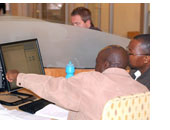 2nd Cycle Deadline: July 21, 2014 | Application and Fellowship Details for Scholars and Hosts 2nd Cycle Deadline: July 21, 2014 | Application and Fellowship Details for Scholars and HostsThe Carnegie African Diaspora Fellowship Program selected 33 African Diaspora scholars to collaborate with higher education institutions in Africa on curriculum co-development, research, graduate teaching, training and mentoring activities. The winning projects were submitted by 24 institutions in Ghana, Kenya, Nigeria, South Africa, Tanzania and Uganda. The scholars will receive Fellowships to travel to the African host institutions beginning this month to undertake the projects. From archaeology to linguistics and veterinary medicine, the projects span an impressive range of fields across the arts and humanities, social sciences, education, sciences, technology, engineering and mathematics.
This innovative Fellowship program facilitates engagement between scholars born in Africa who are now based in the United States or Canada and scholars in Africa on mutually beneficial academic activities. More opportunities are available. Scholars can apply for Fellowships and African host institutions can submit project requests until July 21, 2014, to be considered in the second selection cycle. Selected Fellows and Hosts will be announced in October for project visits to be conducted between December 2014 and August 2015. The program is managed by the Institute of International Education (IIE) in collaboration with Quinnipiac University, which chairs the Advisory Council, and is funded by the Carnegie Corporation of New York.
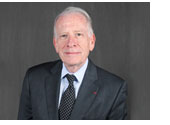 IIE President Allan Goodman’s latest blog shares about his trip to Jerusalem to present the 10th IIE Victor J. Goldberg Prize for Peace in the Middle East. Referencing the separation barrier at the West Bank, Goodman writes, "The teams that have won IIE Goldberg Prizes founded and worked in amazing civil society organizations that, among other things, advanced the human rights of all, as they contributed to the hope that the way to peace was not through separation but through embracing each other’s humanity." IIE President Allan Goodman’s latest blog shares about his trip to Jerusalem to present the 10th IIE Victor J. Goldberg Prize for Peace in the Middle East. Referencing the separation barrier at the West Bank, Goodman writes, "The teams that have won IIE Goldberg Prizes founded and worked in amazing civil society organizations that, among other things, advanced the human rights of all, as they contributed to the hope that the way to peace was not through separation but through embracing each other’s humanity."Conferences
October 23-25, 2014 | Barcelona, Spain
Early Registration Deadline: August 27, 2014 | Registration and Conference Details
The Forum’s Second European Conference in Barcelona, "What Does it Mean to be a ‘Traditional’ Destination? Challenges & Opportunities for Education Abroad in Europe," will be held at the Universitat Pompeu Fabra in Barcelona, Spain.
In recent years, the field of education abroad has witnessed an emerging trend of increased education abroad programs located in "non-traditional" or "exotic" destinations. While Europe may seem traditional and familiar, its diversity of cultures and communities and program models consistently forces programs and students to reexamine that perception. This conference will explore the challenges and opportunities for education abroad in the context of the view of Europe as a traditional destination. How has education abroad in Europe evolved over the years? How will it continue to evolve? How can we prepare students to value the realities of the "contemporary" European experience?
The conference will bring together education abroad administrators, faculty, resident directors, and administrators from programs and universities based in Europe and the United States to share their diverse perspectives.
Deadlines
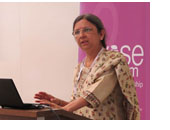 November 1–3, 2014 | Doha, Qatar November 1–3, 2014 | Doha, QatarNew Application Deadline: June 30, 2014 | Application and Workshop Details
The Qatar Foundation’s World Innovation Summit for Education (WISE) Program for Education Leadership will hold its fourth annual workshop in Doha, Qatar from November 1 – 3, 2014 and is currently accepting applications. The goal of the WISE Program is to enhance leadership skills for new university presidents and emerging higher education leaders from developing countries.
Applicants must fulfill all of the following criteria in order to apply:
The World Innovation Summit for Education was established by Qatar Foundation in 2009 under the patronage of its chairperson, Her Highness Sheikha Moza bint Nasser. WISE is an international, multisectoral initiative for creative thinking, debate, purposeful action and empowerment through education. Through ongoing programs and the annual Summit, WISE is a global platform for promoting collaboration and new approaches toward building the future of education.
If you are a current university president, vice-chancellor, rector, or other chief executive officer, or you would like to nominate someone to participate in the 2014 WISE Program for Education Leadership, please download the application and send, together with the applicant’s bio and CV, to nup@wise.org.qa by June 30, 2014.
Priority Deadline: July 15, 2014 | Registration and Fellowship Details
Atlas Corps is seeking nonprofit leaders from around the world to apply for fellowships in the United States and Latin America. Atlas Corps engages leaders committed to the nonprofit sector in 6-18 month, professional fellowships at organizations to learn best practices, build organizational capacity, and return home to create a network of global leaders. The fellowship includes a living stipend to cover basic expenses (food, local transportation, and shared housing) and health insurance. Applications are accepted year-round, but to be considered for the January class, we encourage applications by July 15, 2014.
Application Deadline: July 31, 2014 | Application and Fund Details
International Education Association of Australia (IEAA) is accepting applications for the Tony Adams Fund in 2014, which provides grants for international education professionals and academics within Australia and internationally. This year’s funding includes provision for two professional development grants: a research project and a doctoral thesis.
Applications are open to professional staff, academics, and researchers working in international education, both in Australia and overseas. Grant recipients will be announced at the Australian International Education Conference (AIEC) in Brisbane, 7–10 October 2014. Professor Tony Adams was a revered leader and highly-regarded mentor to many people working in the international education industry. He was also IEAA’s Foundation President. The Fund was established in 2011 to continue Tony's legacy.
Application Deadline: September 1, 2014 | Application and Grant Details
Following successful competition of establishing a total of twelve linkages between U.S. and Ethiopian universities in 2011 and 2013, the U.S. Embassy in Addis Ababa has decided to issue a call for proposals for a third round of linkage affiliations in 2014-2015. Three to five grants of up to $15,000 each will be made available to winning proposals.
Ethiopian universities have expanded by more than ten-fold over the last 20 years, both in the number of students and the number of universities. This ambitious undertaking is part of Ethiopia’s larger economic expansion plans. University officials recognize the challenges they face and have turned to the United States, and to other countries, for assistance. As part of the U.S. Embassy’s effort to respond to this need, it is again offering seed funding for limited-term cooperative projects between U.S. and Ethiopian universities that will hopefully lead to enduring partnerships of mutual benefit.
Seed Money Competition Objectives:
Fulbright
Every year U.S. scholars in a wide variety of academic disciplines teach and conduct research at educational institutions and non-profit organizations across Sub-Saharan Africa. Typically, Fulbright Scholars not only accomplish their grant-specific goals, they also build lasting relationships that serve as the foundation for on-going projects and other interactions on the personal and the institution level.
Fulbright Scholars have:
Explore core Fulbright U.S. Scholar opportunities in Sub-Saharan Africa by visiting the regional pages on our website.
The Fulbright Program, sponsored by the U.S. Department of State’s Bureau of Educational and Cultural Affairs, is the U.S. government’s flagship international exchange program and is supported by the people of the United States and partner countries around the world. For more information, visit eca.state.gov/fulbright.
On June 20, the Fulbright Regional Network for Applied Research (NEXUS) Program began its third iteration with a new cohort of twenty NEXUS scholars who will engage in multi-disciplinary, team-based research on climate change and adaptation strategies in the Western Hemisphere. Jointly funded by the U.S. Department of State’s Bureau of Educational and Cultural Affairs and the Brazilian Agency for Support and Evaluation of Graduate Studies (CAPES), Fulbright NEXUS provides a platform for scholars from across the region to engage in collaborative thinking, problem-solving, and research on important issues of shared priority.
Selected scholars will spend two years researching and implementing projects related to public policy at the local, national, and regional levels to improve the quality of life for communities across the Western Hemisphere. Fulbright NEXUS scholars are expected to work with governments, NGOs, businesses, and communities to inform their research. By strengthening educational exchange in the region, the Fulbright NEXUS program contributes to President Obama’s 100,000 Strong in the Americas initiative, which aims to promote cooperation and prosperity in the Americas through expansion of international student exchange programs in Latin America, the Caribbean, and the United States.
The project will be led by Dr. Daniel Kammen, a Nobel Laureate and professor and founding director of the Renewable and Appropriate Energy Laboratory at the University of California, Berkeley, and Dr. Sergio Pacca, professor and director of the Research Group on Carbon Emissions Policy and Regulation (NUPPREC-USP) at the University of São Paulo, in Brazil.
For more information on the Fulbright NEXUS Program, please contact Katrin DeWindt at kdewindt@iie.org or (202)686-6254.
Librarian of Congress James H. Billington announced the appointment of Charles Wright as the Library’s 20th Poet Laureate Consultant in Poetry for 2014-2015. A former Fulbright fellow in Italy, Wright has authored numerous collections of verse on European modernism and the American South. An article in the New York Times quotes Billington on Wright’s work, "His combination of literary elegance and genuine humility—It’s just the rare alchemy of a great poet."
Partnerships
Gadjah Mada University hosted sixty educators and administrators from the United States and Indonesia on June 16–18 for a workshop to develop new research partnerships, explore potential areas of collaboration, and initiate joint proposals in the areas of sustainable environment and resilient community. The workshop is the first major activity planned by the USIPP Consortium, a bi-national group of twelve colleges and universities committed to advancing U.S.-Indonesia academic collaboration. Launched in May 2013, the USIPP Consortium includes six Indonesian and six U.S. higher education institutions.
The USIPP Consortium is a direct outcome of a two-year grant from the U.S. Department of State, Bureau of Educational and Cultural Affairs (ECA), which funded the U.S. Indonesia Partnership Program that was administered by IIE from 2010–2012.
Study Abroad
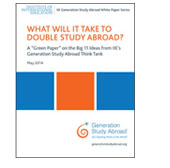 The outcomes from IIE’s "Generation Study Abroad Think Tank," have been documented in the IIE green paper, "What Will it Take to Double Study Abroad?" This paper lays the foundation for an ongoing discussion around how to increase the number of students studying abroad in the short term and to shift the paradigm over the long term. We encourage you to share your insights and best practices with the community by commenting on the 11 Big Ideas outlined in the paper. The outcomes from IIE’s "Generation Study Abroad Think Tank," have been documented in the IIE green paper, "What Will it Take to Double Study Abroad?" This paper lays the foundation for an ongoing discussion around how to increase the number of students studying abroad in the short term and to shift the paradigm over the long term. We encourage you to share your insights and best practices with the community by commenting on the 11 Big Ideas outlined in the paper.Idea 3: reframe the problem as a K-20 issue and address it at all levels
In order to make study abroad an essential part of what it means to be educated, student and family expectations must be addressed at a much younger age. Teachers are key influencers who can help students understand the importance of global awareness early on, and inspire them to be curious about and engaged in the world.
Share your insights and best practices on this topic: Submit a comment on our blog.
Scholar Rescue Fund
Applications Deadline: August 1, 2014 | Application and Fellowship Details  The Institute of International Education's Scholar Rescue Fund (IIE-SRF) announces an August 1 deadline for its next round of applications from scholars facing threats to their lives or academic work. Fellowships support temporary academic positions at colleges, universities, and other research institutions outside the scholars' home countries anywhere in the world. The Institute of International Education's Scholar Rescue Fund (IIE-SRF) announces an August 1 deadline for its next round of applications from scholars facing threats to their lives or academic work. Fellowships support temporary academic positions at colleges, universities, and other research institutions outside the scholars' home countries anywhere in the world. IIE-SRF formalizes an unwavering commitment to preserve the lives, voices, and ideas of scholars around the globe. Since IIE-SRF's founding in 2002, the program has provided academic fellowships to scholars from 50 countries, placing them at over 300 host partner institutions in 40 countries.
Who can apply:
Professors, researchers, and public intellectuals from any country, field, or discipline may apply. Please refer eligible candidates and forward this announcement to any academic colleagues who may be interested.
Students or professionals seeking funding to pursue academic studies or training are not eligible.
How IIE's Scholar Rescue Fund works:
IIE-SRF fellowships support visiting academic positions for up to one calendar year. Awards are issued for up to US $25,000, plus individual health insurance coverage and professional development assistance.
Fellowships are disbursed through dedicated host academic institutions, which provide direct support and a safe haven for IIE-SRF fellows. In most cases, hosts are asked to match the IIE-SRF fellowship award by providing salary or stipend support and other in-kind assistance that would make the scholar's appointment comparable to other visiting academic positions. Please note that applications are accepted at any time and can be considered on an emergency basis.
|
| www.iie.org/iienetwork • Member website of the Institute of International Education © 2025 Institute of International Education. All rights reserved. |

